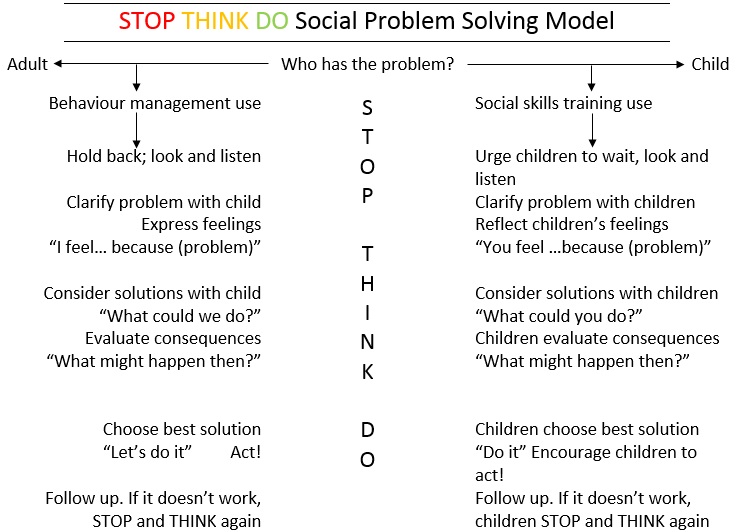
Core skills and process of Stop Think Do
- Critical elements in social skills training
- perceptual skills (ability to read visual, auditory, spatial cues)
- self awareness and self control (understanding the link between feelings and behaviour)
- cognitive skills (how to think consequentially to solve problems)
- behavioural skills (what to do verbally and non-verbally)
- pro-social motivation (to want to apply social skills in the longer term in the real world)
- support of significant others-parents, teachers, peers (for maintenance and skill transfer)
- Problem solving core of the program
- Research
- Developing a broad range of social skills in children and adolescents including verbalising feelings, positive assertiveness, controlling attention seeking and demanding behaviour, personal awareness, coping with shyness, coping with stress and teasing in non-aggressive ways, making and keeping friends, thinking before acting, controlling anger, problem ownership, listening skills, resolving conflicts with peers, enhancing group skills.
- Sociometric data also suggests greater peer acceptability and social status.
- Teachers can run the program with their whole class to produce gains equal to those obtained when children are withdrawn for more intensive small group input with parent training.
- Gains show further significant improvement over time. Other research shows maximum gains are achieved with cognitive-behavioural programs after 1 year when the process becomes assimilated as a modus operandi.
- Gains generalise across settings. Parents not directly involved in training reported significant improvements in socially appropriate behaviour at home and improved sibling relationships.
- Adults involved generally enjoy in-service training and implementing the program and report that their management skills are enhanced considerably. In school settings, a whole school in-servicing including ancillary staff and also parents is most useful to ensure consistency.
- The traffic light is powerful as a cue around school grounds, in classrooms and homes. This also helps those with reading difficulties or from different cultural backgrounds to visualise the problem solving process. Children may have their own set of lights.
- KidsMatter initiative
This multi-factor, broad-based approach is reflected in my definition of social skills
‘Social skills refer to the ability to perceive social cues, control emotional reactions, organize cognitions and produce behaviours with the motivation to achieve socially acceptable outcomes.’
Thus, the critical elements in training social skills must include
The core of the program is the STOP THINK DO social problem solving method. Children learn this method for resolving child/child conflicts, with adults adopting the role of a ‘third person’ facilitator of the process in ongoing peer conflicts. Adults also use STOP THINK DO themselves to manage children’s behaviour in adult/child conflicts, in this case directly sharing the responsibility for problem solving with the child. The steps are largely the same for adult and child, following the traffic light symbol.

While the process initially seems lengthy, it will be shortcut with practice to
| "I feel……..because (problem)" | STOP | "You feel………because (problem)" |
| "What could we try?" | THINK | "What could you try?" |
| "Let’s do it!" | DO | "Do it!" |
This method develops self control, perceptual and communication skills primarily at STOP, cognitive problem solving skills at THINK and behavioural skills at DO. Children with social-behavioural problems are usually stuck at one of these steps. Dependent, immature children are stuck at STOP; they tend not to think or do much for themselves but constantly rely on others. Shy, anxious children are stuck at THINK; they often think too much about what could happen and find it very difficult to choose what to do. Impulsive, aggressive children are stuck at DO; they do and do and rarely stop to think. The program aims to train all children to move comfortably through all steps with positive feedback and support from adults and peers.
In fact, self discipline, self control, self esteem, self confidence as well as maturity, respect, independence, responsibility – all the ethereal qualities we hope our children develop – are outcomes of practicing to stop, think and do over and over again. Children become aware of how to clarify problems and feelings (‘I understand’ at STOP), how to find answers (‘I can think’ at THINK), how to make decisions and act (‘I choose to do’ at DO) and to want to be social when others say ‘You are doing okay'.
The STOP THINK DO social skills/behaviour management program has support from formal research studies and considerable anecdotal data over the past decades. The program has been shown to be useful for
Since its inception by the Federal Government, STOP THINK DO has been a recommended resource for use in preschools and primary schools to promote the emotional-behavioural-social well-being of children in Australian schools.